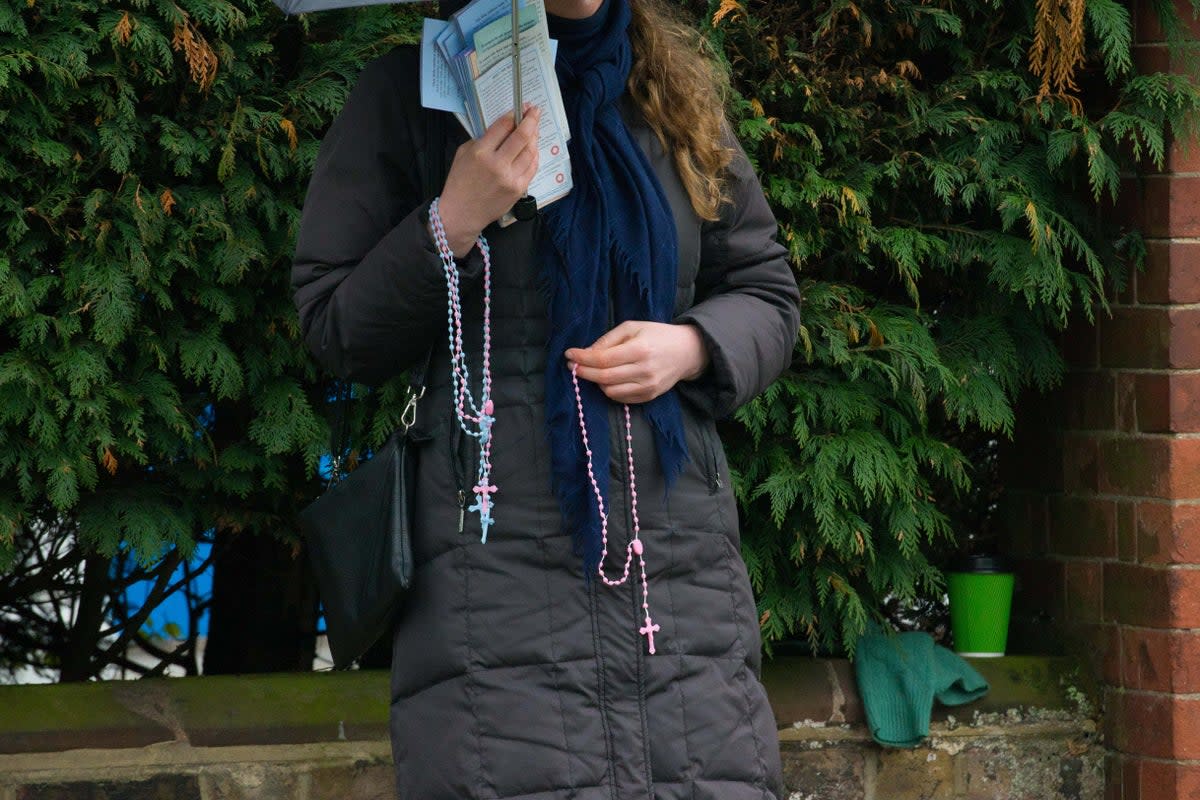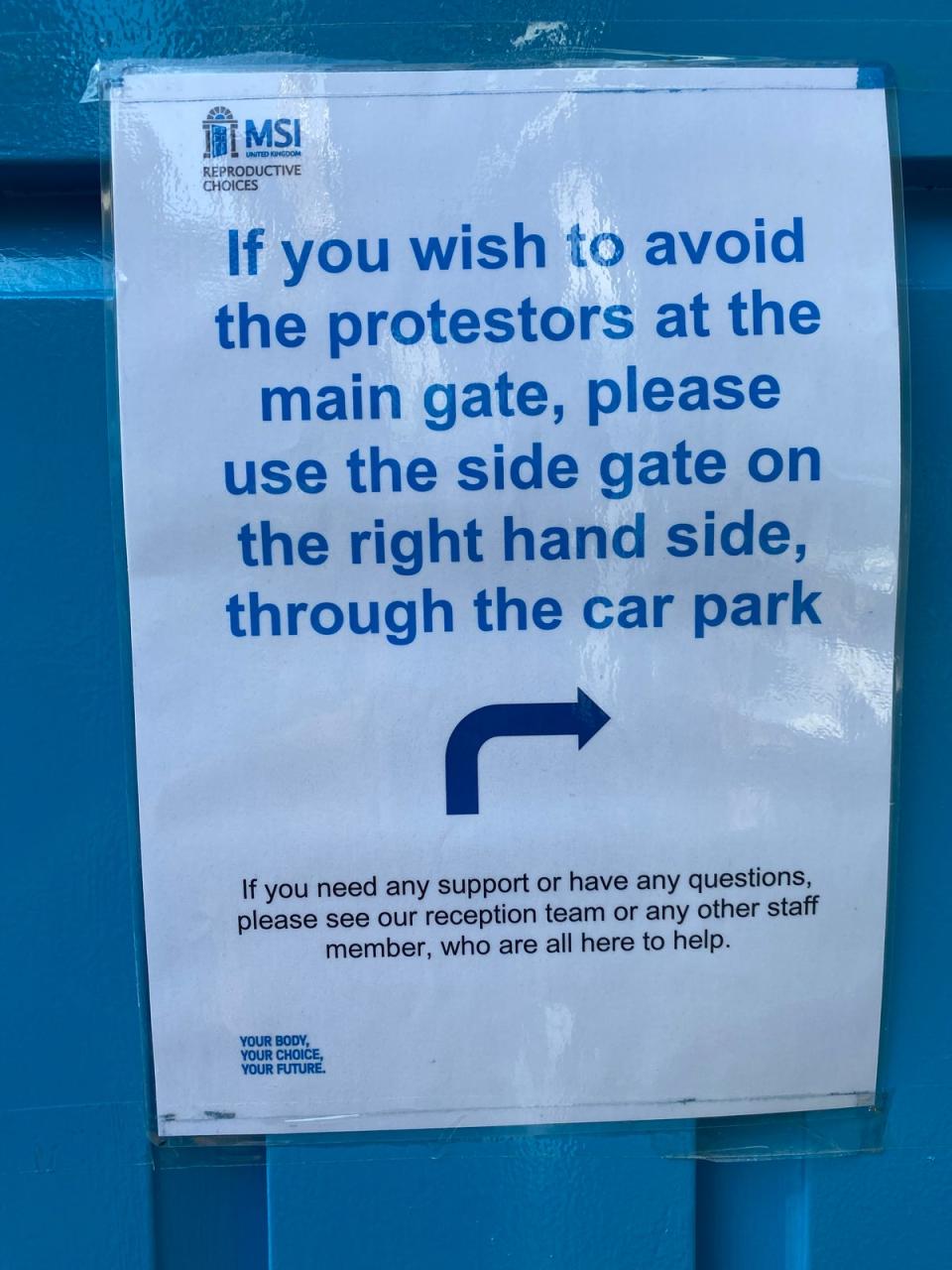Anti-abortion activists ramping up protests outside clinics after failure to introduce buffer zones

Anti-abortion activists are ramping up protests outside clinics in the wake of the government’s failure to introduce “buffer zones” outside medical centres, healthcare providers have warned.
MPs voted in favour of nationwide buffer zones outside abortion clinics in England and Wales in October 2022 but the Home Office has failed to roll them out.
MSI Reproductive Choices, the UK’s leading abortion provider, called for the government to bring in the safe zones immediately. They are supposed to stop anti-abortion demonstrators standing outside or in close vicinity.
MSI, which has more than 60 clinics across England, told The Independent the government rapidly rolled out all other elements of the Public Order Act last year but has failed to implement the part of the legislation which would introduce buffer zones.
Have you been affected by this? Email maya.oppenheim@independent.co.uk
It is a year since buffer zones formally became law in England and Wales. The Home Office has now said it plans to introduce the part of the Public Order Act which looks at the offence of interference with access to or provision of abortion services no later than spring but has failed to give a specific date.
Olivia Home, who manages one of MSI Reproductive Choices’ abortion clinics in central London, said anti-abortion protesters are currently outside four to five times a week for a few hours per day.
“They have increased activity in the last year,” she added. “They were there two to three days a week before.”
Ms Home said the demonstrators harass women seeking abortions – with some followed and pestered as they walk to the train station after treatment.
She added: “They shout insults at women and people, they either shout ‘murderer’, ‘baby killer’ or anything along those lines. They hand out leaflets and rosary beads and the leaflets may contain graphic and quite offensive imagery.
“They also hand out baby toys whose limbs have been removed which are covered in fake blood. They sometimes spit from their mouths at clients or healthcare professionals or they splash holy water at them.”
Ms Home said that given the clinic sometimes sees 44 clients in a day – most of whom are getting abortions – the harassment has profound repercussions.
Some women arrive at the clinic “crying their eyes out, clearly distressed and overwhelmed from the interaction they had with a protester”, she added.

Anti-abortion protesters also shouted abuse at Ms Home and her colleagues during a practice fire drill, she said.
“They were saying we should be ashamed of ourselves and how disgusted we should be for working for MSI,” she added.
“In some encounters with the anti-protesters, it seems like they are brainwashed. I look out of the office sometimes and they give you a sinister grin.”
Sometimes the leaflets protesters hand out falsely claim abortions can lead to breast cancer or suicide, she said, adding that she has called the phone numbers printed in the leaflets on several occasions but they don’t connect.
“I feel utter frustration, anger and absolute devastation for our clients. Our clients and staff are dealing with this on a day-to-day basis,” said Ms Home.
“It is vital to stress the importance of people having their own bodily autonomy and feeling safe and supported when accessing abortion – clients aren’t able to do that in the current climate.”
Dr Pam Lowe, a sociologist who specialises in anti-abortion activism in the UK, added: “Anti-abortion groups have been working tirelessly to prevent buffer zones from being put in place. This has included organising mass letter-writing campaigns.
“It is particularly concerning that Alliance Defending Freedom, a UK branch of a US organisation designated as a hate group by the Southern Poverty Law Centre, has a close relationship to a small number of anti-abortion MPs and has been actively lobbying against protecting women outside clinics.”
They shout insults at women and people, they either shout ‘murderer’, ‘baby killer’ or anything along those lines.
Olivia Home
Lucy, who had an abortion with MSI and whose name we have changed, said the hardest part of her termination involved encountering anti-abortion protesters outside the clinic.
“When I found out I was pregnant it was a complete shock as I had only been with my partner a few months,” the 33-year-old recalled. “I had always wanted children but in my current circumstance I was not ready to support a child emotionally or financially and neither was my partner.”
She was in a minimum-wage job and her partner did not work, she added, explaining they were not living together and were perpetually arguing.
“The hardest part was walking past the protesters at my first appointment,” she added. “No one has the right to tell you what to do with your body, and it bothered me that without even knowing my situation or how horrible I felt, they were trying to.”
Eliza – who we interviewed under a pseudonym – also encountered protesters when accessing an abortion. She said the ordeal disturbed her.
She added: “Falling pregnant unintentionally with a new partner was a very scary time. I chose to have an abortion because I didn’t know my partner long enough and I felt too young. I wanted to achieve so much more in my life so when I do have a child, I can provide the best life possible for them.
“There were elderly people holding religious pictures up and unborn babies. It was deeply unsettling because I wasn’t having an abortion for fun. It was an immensely sad time and I knew it was for the right reason. So them standing outside made me feel worse and was so horrible.”
A spokesperson for the Home Office said it was “completely unacceptable that anyone should feel harassed or intimidated whilst exercising their legal right to access abortion services”, adding: “We are currently considering all responses to the consultation and final guidance will be published in due course.”

 Yahoo Lifestyle
Yahoo Lifestyle 
